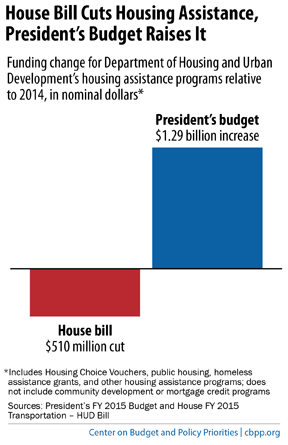BEYOND THE NUMBERS
Update, May 8: We’ve updated this post to correct the figure for the House bill’s funding cut relative to the 2014 level: the cut is $510 million.
The House Appropriations Committee will vote tomorrow on a 2015 spending bill for the Department of Housing and Urban Development (HUD) that cuts funding for rental assistance and anti-homelessness programs by $510 million below this year’s level, despite rising housing affordability problems. Here are five major problems with the bill:
- Likely provides too little money to renew all of the Housing Choice Vouchers that low-income families will use this year. The bill’s $328 million funding increase to renew existing vouchers would only cover the cost of new vouchers that Congress funded in 2014 for homeless veterans and families that recently lost other housing assistance. It wouldn’t be enough to continue all vouchers funded in 2014 unless local housing agencies freeze the dollar value of their vouchers despite rising rents in many markets, forcing cash-strapped residents to pay even more to remain in their homes. (The President’s budget boosts voucher renewal funding by twice as much as the House bill.) Moreover, the bill locks in place the loss of at least 40,000 housing vouchers that were cut last year due to sequestration and not funded this year.Image
- Cuts voucher administrative funding but doesn’t help agencies cut administrative costs. While cutting funding by $150 million below this year’s level (and $360 million below the President’s request), the bill includes no changes to streamline agencies’ administrative functions, such as allowing them to check the incomes of elderly and disabled individuals on fixed incomes less frequently.
- Deepens the underfunding of public housing. The bill cuts funding by $290 million below the inflation-adjusted 2014 level, which already falls well short of what agencies need to operate public housing developments and address pressing repair needs. The cut would increase the risk that living conditions will deteriorate in public housing units, most of which house seniors and people with disabilities. (The bill also omits an important Administration proposal to expand the Rental Assistance Demonstration, which enables agencies to leverage private investment to help renovate public housing.)
- Stalls recent progress on reducing homelessness. The bill funds homeless assistance at $2.1 billion, the same level as in 2014 and $300 million below the President’s request. Homeless assistance grants have contributed to a significant drop in the number of people with serious disabilities experiencing long-term homelessness, and the President’s budget would make further progress toward eliminating chronic homelessness. One positive feature of the House bill is that it would fund 10,000 new vouchers for supportive housing for homeless veterans.
- Reduces funding for new affordable housing. The bill cuts funding for the HOME block grant, which helps rehabilitate or construct rental properties and assist low-income homeowners, by $300 million below the 2014 level. And it doesn’t include the President’s requested funding for rental assistance for 5,000 new supportive housing units for seniors and people with disabilities.
In fairness to the House committee, it’s working under spending limits for non-defense discretionary programs that are too tight. (Adding to the problem, the Congressional Budget Office’s estimate of the 2015 receipts for the Federal Housing Administration’s mortgage insurance program — receipts that can offset program spending — are much lower than the Office of Management and Budget’s estimate.) But Congress needs to overcome these accounting problems and do better to help low-income families keep a roof over their heads.

